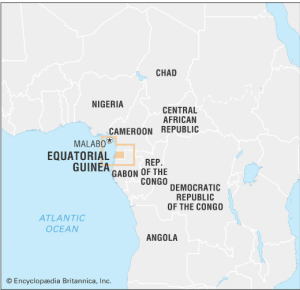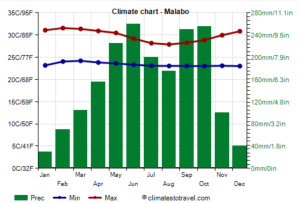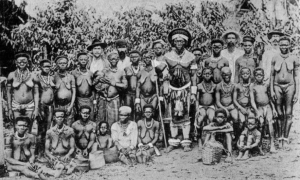Location, Size and population

Located on the western coast of Central Africa is the sovereign state of Equatorial Guinea. The country derives its name from its proximity to the equator. The Gulf of Guinea is situated in the western direction, while Cameroon is to the north. To the east and south, it is bordered by Gabon.
Equatorial Guinea has a total land area of about 28,051 square kilometers (10,831 square miles). The region consists of the Ro Muni peninsula, many islands, most notably Bioko (which houses the nation’s capital, Malabo), Annobón, and other smaller islands.
According to the latest study in 2022, the expected population of Equatorial Guinea is around 1.4 million. It is important to note that population estimates may undergo changes over time due to factors such as immigration, birth rates, and other demographic factors. To get the most up-to-date population figures, it is recommended to consult more current sources.
Climate

Equatorial Guinea’s climatic conditions are distinguished by continuously high temperatures and substantial amounts of humidity. The geographical location of the region on the western coast of Central Africa, as well as its proximity to the equator, have influence on the local climate. The country has little fluctuations in temperature throughout the seasons.
Language
Equatorial Guinea, owing to its historical colonial legacy and diverse ethnic composition, manifests itself as a linguistically diverse country, whereby its populace exhibits proficiency in several distinct languages. Equatorial Guinea, as a constituent member of the International Organization of La Francophonie, designates both Spanish and French as its official languages. Spanish is the designated language for official use throughout the government, educational institutions, and media platforms. French is sometimes used in the field of international relations and diplomatic communications.
History

Equatorial Guinea’s historical trajectory has been characterized by a multifaceted and sometimes tumultuous series of events, including colonial governance, political transformations, and struggles for independence. The following is a concise overview of the historical trajectory of Equatorial Guinea:
The Pre-Colonial Period refers to the time before the arrival of European colonizers. Prior to European colonialism, Equatorial Guinea was inhabited by several ethnic groups such as the Fang, Bubi, and Bantu-speaking peoples. Each of these tribes had own communities, traditions, and languages.
The Spanish started their presence in the region during the latter half of the 19th century, and afterwards established a colony on the island of Fernando Po (presently referred to as Bioko) in the year 1844. During the first decades of the 20th century, Spain asserted its territorial claim on the Ro Muni mainland as well.
French participation in the territorial disputes with Spain revolved upon the demarcation of borders between their respective colonies. Additionally, France exerted control over the neighboring nation of Gabon.
Equatorial Guinea achieved independence from Spain on October 12, 1968. Francisco Macas Nguema, the former prime minister, was chosen as the first president of the republic.
The political situation of Equatorial Guinea was characterized by President Macas’ authoritarian governance, which led to economic mismanagement and infringements against human rights. The oppressive nature of Macas’s rule led to its designation as “Africa’s Monster.”
The coup and subsequent change in leadership occurred in 1979, when Teodoro Obiang Nguema Mbasogo, who happened to be the nephew of the president, organized the removal of President Macas from power. President Obiang, who continues to hold power at now, assumed his leadership after the aforementioned coup.
The government led by President Obiang has been distinguished by a state of political stability, with claims pertaining to corruption and infringements of human rights.
The economy of Equatorial Guinea saw significant growth after the discovery of oil in the mid-1990s. Despite being one of the leading oil-producing nations in Africa, the country’s economic prosperity derived from this valuable resource has not consistently translated into widespread development.
